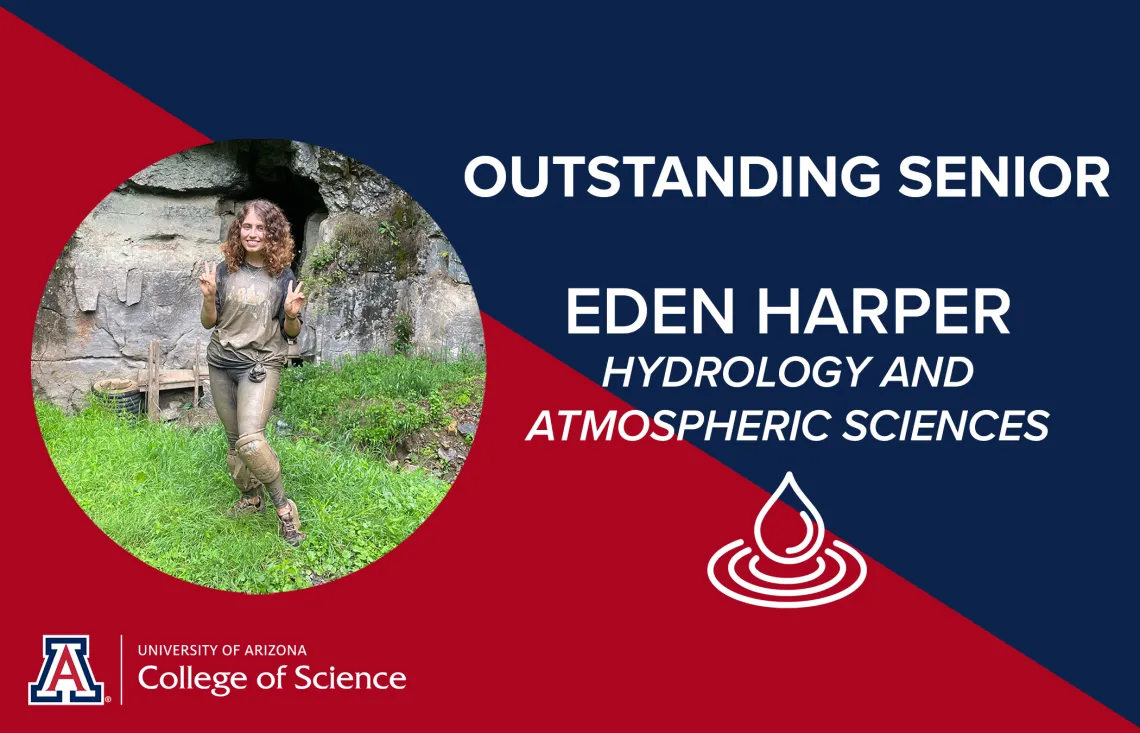Outstanding Seniors in the College of Science: Eden Harper

This spring, each department in the University of Arizona's College of Science nominated an outstanding senior who went above and beyond during their time as a Wildcat. We are pleased to share their stories as they reflect on their time at UArizona. Our next Outstanding Senior is Eden Harper in the Department of Hydrology and Atmospheric Sciences.
Eden Harper
Department: Hydrology and Atmospheric Sciences
College of Science: Why did you choose your area of study?
Harper: I had two major interests growing up, science and environmentalism. It would only be natural then that my favorite class in high school was environmental science. It was not enough to just learn about these issues though, I was even more interested in how we can solve these problems and take action. Problem solving is something I really focus on, at my core, I just want to be able to contribute something positive back to the community. It seemed that the number one way to do this was to focus my attention on preserving water resources. Beyond our basic survival needs, water is used in agriculture for food production, it's used in most industrial processes, and it plays a significant role in energy production. And despite freshwater’s recognition as a renewable resource, in regions like the U.S. Southwest, its use exceeds the ability of natural processes to replenish its supply. Our dependence on water and its growing scarcity in the Southwest creates a very interesting and complex problem, one that demands innovative and creative solutions. As we move forward, the need for sustainable water management will only intensify. These factors are what led me to study Hydrology at the University of Arizona, it being one of the top schools for the field.
COS: Tell us about a class or research project you really enjoyed.
Harper: I’ve been doing research for Pima County Regional Flood Control District (PCRFCD) regarding one of their recently implemented Green Infrastructure projects, Seneca Park. This park is multi-purpose, acting as a gorgeous recreation space in central Tucson, while also providing three large retention basins that have the ability to harvest stormwater in the case of significant flooding. As we all know, Tucson tends to flood easily after even the slightest rain. This is because during the early days of Tucson development, not much planning went into adding traditional drainage systems because it doesn’t rain often. As Tucson has grown much larger, the increased amount of roads, buildings, and parking lots have decreased spaces where runoff can infiltrate into the ground. Now what we see are streets being completely overwhelmed with water, which is why new projects like Seneca park were developed. My research has involved mapping how runoff flows from streets to the Seneca park basins, analyzing how the different basins interact with each when and if they overflow, measuring the stormwater harvested after its installation, and assessing how much runoff bypasses the park basins altogether. Investigating this project will give more insight into how these designs work, and if they can be designed even better. I’ve really enjoyed my experience on this project. The idea of building green spaces to deal with environmental issues is very appealing to me, they tend to be more effective than traditional infrastructure and provide even more benefits when it comes to the community. Not only does this neighborhood experience less flooding, this park captures a significant volume of stormwater in the case of water scarcity in Arizona, while also providing a nice community space.
COS: What is one specific memory from your time at UA that you'll cherish forever?
Harper: I think it’s the collective memories of the people I’ve met who’ve become somewhat of a second family. I am originally an east coaster, so I am very far from home and I only get to visit during the summer and winter breaks. That being said, not only have my friends at the university made my time here a joyous experience, they're also probably the only reason I’ve managed to survive being out here by myself. I could not imagine doing it alone, or not having a group of people to struggle with on the same homework together. The laughs and deep talks I’ve had during what were supposed to be study sessions will be the things I’ll look back on the most.
COS: What is next for you after graduation?
Harper: After graduation, I will be working as a hydrogeologist intern over the summer for an environmental consulting firm. There, I’ll be assisting in field work and project research involving monitoring groundwater near mine locations in Arizona. Beyond technical skill development, I’ll also be developing some of the writing and communication skills required to convey necessary information to stakeholders. After the summer, I will be returning to the University of Arizona for a masters in Hydrology, which will hopefully take only an additional year due to my time in the accelerated masters program. For my masters thesis, I will be continuing my work with PCRFCD, but expanding the research onto multiple Green Infrastructure projects.

